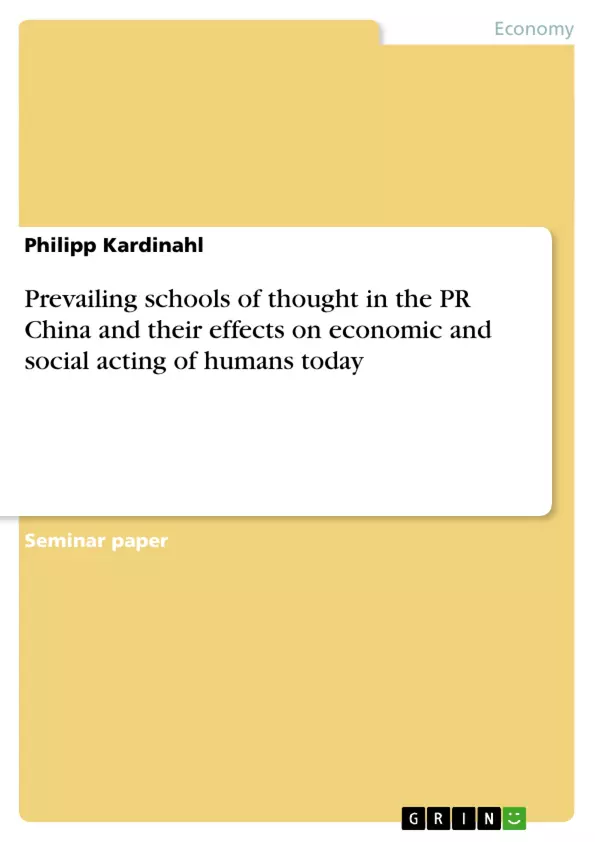One of the most discussed topics of the past years in the economy-related press was the economic and political development of the People's Republic of China. A daily paper without reference to China is hardly conceivable today. Average economic growth rates within the two digit range over the past 30 years, an enormous market with more than 1.3 billion people and economically backward areas woke the pioneer spirit of western gold diggers. The Chinese population is by far bigger than those of the European Union, the United States, Australia and Canada together. In addition to this it comes that China was up to 30 years ago not only ruled by communism, but also robbed of its thousands of years-old traditions by the maoistic Cultural Revolution. The question is how it was possible that this country could ascend in such a short time to one of the most successful economies in the world. That a certain cultural value system or ethics is a fundamental basis for the economic acting of a nation was already determined by Adam Smith in his work “An Inquiry into the Nature and Causes of the Wealth of Nations”.1 Max Weber also built up on this realization (see chapter two). The following work would like to approach this phenomenom from the cultural point of view and follow the question, which cultural bases rule in the Chinese society. This should be tried by a short representation of the most important schools of thought in China, which cannot happen finally because of the compendiousness of the work. Rather it should be understood as a suggestion for thinking about Chinese culture and its differences. Also this work will not take culture-theoretical factors as a basis for analysis. Rather it is to be tried to represent the most important differences between the European and the Chinese culture and to sensitize for this. It is not an aim of this resignment to set up regularities of the Chinese character but to refer to possible differences.
Inhaltsverzeichnis (Table of Contents)
- Introduction
- Approximation to the cultural term
- Max Weber
- Guilt and shame cultures
- Western and eastern understanding of free-market economy
- The role of religion in the social context
- Prevailing schools of thought in the PR China
- Confucianism
- Daoism
- Buddhism
- Effects on the present behavior
- Guanxi
- Danwei
- Hierarchy
- Face saving
- Harmony (xietiao) and conflict delimitation
- Politeness
Zielsetzung und Themenschwerpunkte (Objectives and Key Themes)
This work examines the cultural foundations of economic behavior in China, focusing on how historical schools of thought influence contemporary actions. It aims to highlight key differences between Western and Chinese cultural values and their impact on economic development. The analysis is not intended to establish rigid generalizations about Chinese character, but rather to identify potential cultural distinctions.- The impact of Confucianism, Daoism, and Buddhism on Chinese culture.
- The role of cultural values in shaping economic behavior in China.
- A comparison of Western and Eastern cultural values and their influence on economic systems.
- The effects of historical and cultural factors on China's rapid economic growth.
- Understanding the differences between Western and Chinese cultural perspectives.
Zusammenfassung der Kapitel (Chapter Summaries)
Chapter 1: Introduction introduces the topic of China's economic rise and its relation to cultural values, referencing Adam Smith and Max Weber's work on the relationship between culture and economic activity.
Chapter 2: Approximation to the cultural term defines "culture" within a cultural-anthropological framework and contrasts Western (Greek-Roman and Christian) influences with those shaping East Asian cultures, focusing on Confucianism, Daoism, and Buddhism.
Chapter 2.1: Max Weber briefly discusses Max Weber's theories on the relationship between Protestantism and the development of capitalism and explains why a detailed analysis of Weber's work is omitted from this paper.
Chapter 3: Prevailing schools of thought in the PR China provides a short overview of Confucianism, Daoism, and Buddhism within the context of Chinese culture.
Chapter 4: Effects on the present behavior explores how the aforementioned schools of thought influence contemporary Chinese social and economic behavior through concepts such as Guanxi, Danwei, hierarchy, face-saving, harmony, and politeness.
Schlüsselwörter (Keywords)
Chinese culture, economic development, Confucianism, Daoism, Buddhism, Guanxi, Danwei, face saving, harmony, cultural values, economic behavior, East-West comparison, Max Weber.Frequently Asked Questions
How do traditional schools of thought influence modern China?
Confucianism, Daoism, and Buddhism provide the ethical and cultural foundation for social and economic behavior, influencing everything from hierarchy to interpersonal relationships.
What is "Guanxi" in the Chinese economy?
Guanxi refers to the system of social networks and influential relationships which facilitate business and social dealings in China.
What is the concept of "Face Saving"?
Face saving (mianzi) is a critical cultural value in China that emphasizes maintaining one's dignity and social standing, as well as showing respect to others to avoid public embarrassment.
How does Max Weber's theory relate to China's development?
Max Weber explored how cultural and religious values (like the Protestant ethic) influence capitalism. Scholars apply similar logic to understand how Chinese cultural values have driven its rapid economic rise.
What is the difference between Western and Chinese market understandings?
Western markets often rely on legal contracts and individual competition, while the Chinese model places a higher emphasis on harmony (xietiao), collective hierarchy, and long-term relationships.
- Quote paper
- Philipp Kardinahl (Author), 2008, Prevailing schools of thought in the PR China and their effects on economic and social acting of humans today, Munich, GRIN Verlag, https://www.grin.com/document/119410



